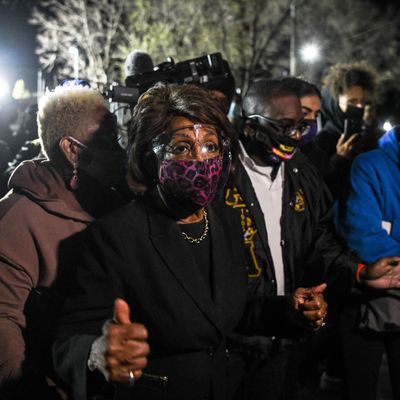
On Saturday night, California representative Maxine Waters was in Brooklyn Center, Minnesota, where the former head of the Minneapolis suburb’s police union shot and killed a 20-year-old Black man, Daunte Wright, earlier in the week. Commenting on the other nation-captivating police killing in the metro area — the murder trial of George Floyd’s killer Derek Chauvin — Waters said that the protest movement has to stay energized if the fired officer is found not guilty.
“We’ve got to stay on the street, and we’ve got to get more active. We’ve got to get more confrontational,” Waters told reporters, when she was asked what would happen if Chauvin was acquitted. “We’ve got to make sure that they know that we mean business.” While the congresswoman has defended herself against a comment that was seized upon and exaggerated by Republican lawmakers — “I am nonviolent,” she said Monday — the sound bite could put the possibility of a guilty verdict in jeopardy.
On the day of closing arguments in the Chauvin murder trial, the former cop’s defense attorney tried to leverage Waters’s attention to motion for a mistrial. “We have U.S. representatives threatening acts of violence in relation to this specific case — it’s mind-boggling,” Eric Nelson said to Hennepin County District Judge Peter Cahill.
Though Cahill did not buy the suggestion that Waters was actively calling for violence, he did reiterate his wish that “elected officials would stop talking about this case, especially in a manner that is disrespectful to the rule of law and to the judicial branch and our function.” And while the judge denied the motion for a mistrial based on Waters’s sound bite — “I don’t think it has prejudiced us with additional material that would prejudice this jury” — he did suggest it could be a problem down the road. “I’ll give you that Congresswoman Waters may have given you something on appeal that may result in this whole trial being overturned,” he told Nelson. While cities throughout the nation have prepared to deploy the National Guard in advance of the decision in the trial, an overturned conviction would inevitably fuel demonstrations against police brutality and a lack of accountability in police shootings.
Following closing arguments in the case on Monday, the jury is now deliberating over their decision on the charges against Chauvin, which include second-degree unintentional murder, third-degree murder, and second-degree manslaughter. On Monday, Judge Cahill told jurors to “plan for long and hope for short.”






























